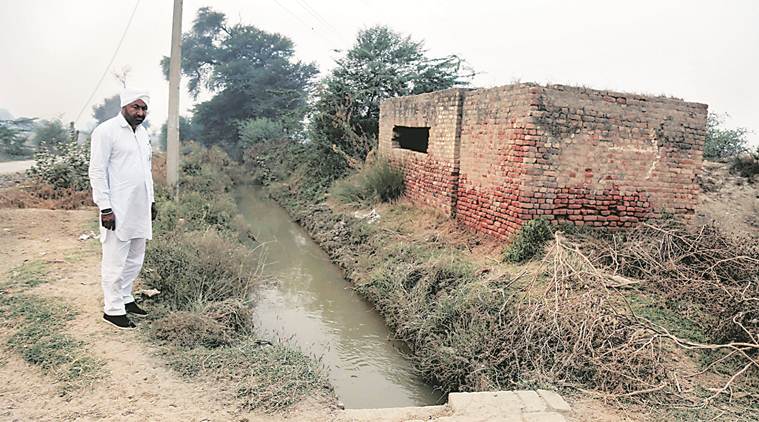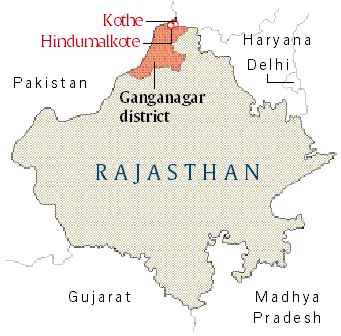 The major issue is a barbed wire fence that cuts across A-minor, a distributary of Gang Canal.
The major issue is a barbed wire fence that cuts across A-minor, a distributary of Gang Canal.
As Rajasthan gears up for the Assembly elections, residents of a small village along the Indo-Pak border get ready to ask a question they have been asking for 20 years: will the canal that is virtually their lifeline be shifted across the fence and made more accessible? Kothe is a small village in Ganganagar district of Rajasthan, where residents depend solely on canals for drinking water and irrigation. The major issue here is a barbed wire fence that cuts across A-minor, a distributary of Gang Canal. Farming is allowed across the barbed wire close to the international border, but crossing the fence is allowed only between 9 am and 4 pm, and only for farming purposes. The restrictions pose a problem for the 3,000-odd villagers of Kothe, which is part of Hindumalkote village panchayat.
Darshan Singh, a resident of Hindumalkote village and president of Water User Association (WUA) of Hindumalkote and adjoining villages, said, “We have adjusted to the time restrictions for farming, in spite of hassles. But the real problem is when there is rain or dust storms, blockages appear in the A-minor across the fence. The water flow stops, and often causes breach. However, after the restricted hours, no one is allowed to go to that side, even to clear the blockage. This is a major problem for the village, but it has not been addressed for more than 20 years.”
He added, “Half of the 2-km minor canal is on the other side of the fence. Every election candidate promises to get the minor canal reconstructed so that it is outside the fence. But this has still not been done. Now, candidates will again come and we will question them.”

Singh said the minor canal is a problem for the BSF as well, as they have do the cleaning across the fence, and oversee security arrangements. Funds are spent on repair work whenever a breach occurs, but a permanent solution is still awaited.
Pala Singh, an elderly farmer, said, “Until the early 1980s, it was not much of a problem as there were few restrictions. But now things have changed.” Farmers in this area grow wheat and cotton. As the ground water is unfit for irrigation and drinking, they depend on canal water. A BSF checkpost is located in Khakian, hence prior permission must be taken for any work across the fence.
There is another BSF checkpost at Hindumalkote, a village with around 3,500 voters. The Fazilka- Karachi railway line passes through this area, but the railway station is no longer in use. Hindumalkote is named after Hindumal, the Diwan of Bikaner, and was an important trade centre in the pre-Independence era. The trade ties extended till Bhawalpur, Karachi, Lahore, Quetta, Peshawar, Kabul and even Afghanistan.
According to the information written at the BSF checkpost. Hindumalkote had the status of a municipal corporation. It was only in 1959 that it was changed to a village panchayat. As all trade was stopped in this area, it was a big setback to business, the history read.
“The railway line passing through Hindumalkote area used to connect Delhi and Mumbai to Bhawalpur (in Pakistan now), Karachi. Post-Independence, Pakistan levelled their side of track, but a train used to run via Hindumalkote up to 1969. In 1976, in view of safety and proximity with the international border, the railway station was shifted 3 km back, to the present location. The old railway station still exists,” said Darshan Singh.
“Politicians say that it will be developed into a tourist spot, but the announcements are done only during polls,” said Jasvir Singh, another villager. “It is a peaceful border area. It should be developed as a tourist location, so that Hindumalkote can become a municipal corporation again,” said Darshan Singh.